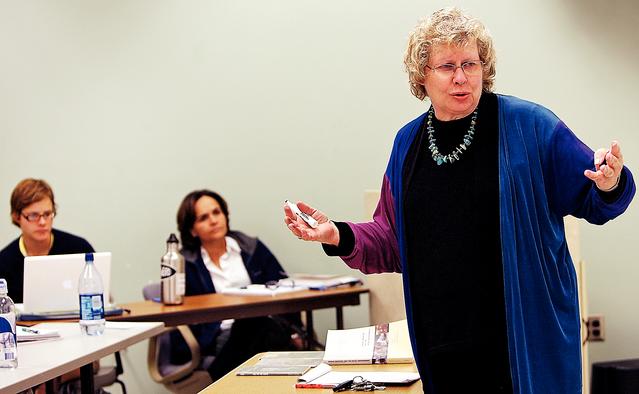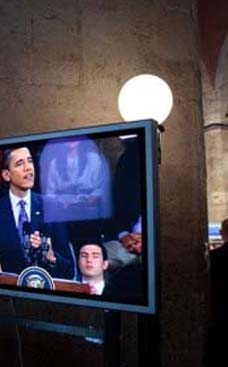
Nichols came to Tucson with her husband in 1970 when he joined the UA medical faculty. They had met at Stanford during their studies. They continued their education on the East Coast, he at Harvard and she at Columbia University in New York City. They also served with the Peace Corps in Peru. Nichols has been the voice and face of social workers in Tucson since the early 1970s, when she began teaching social work in Tempe and then opening the Tucson program in 1978. It is estimated she has worked with 1,700 students during her tenure. Now she's retiring, but don't expect Nichols, 67, to slow down. Later this year she will travel to Zambia, where she plans to teach social service for about 12 months. "I'm a chronic activist," said Nichols during a recent interview in her office off North Bonita Avenue west of the Santa Cruz River. The list of causes is long, but they all focus on the poor and forgotten people of the state. Along with her husband, Dr. Andy Nichols, who died in 2001, she helped expand insurance coverage for Arizona adults and children through the voter-approved Healthy Arizona initiative. It provides money for health care for the working poor from the state's portion of the federal government's tobacco- industry settlement.
Peru RPCV Ann Weaver Nichols is retiring in August as coordinator of the Tucson component of Arizona State University's School of Social Work
Neto's Tucson :
Practicing what she advocates Founder's determination may save Tucson branch of social-work school
By Ernesto Portillo Jr.
Arizona Daily Star
Tucson, Arizona | Published: 04.26.2009
When ASU announced earlier this year that it would close its Tucson social-worker academic branch, Ann Weaver Nichols, who established the program more than 30 years ago, did what she does best: She organized people.
She called on the numerous Southern Arizona graduates she mentored and who today are working in hospitals, hospices, schools, child-welfare and mental-health centers, with the homeless people and the elderly, and in government. They made the case that Arizona State University's School of Social Work should retain its Tucson component because of the greater good it serves. It appears the effort bore fruit.
While the state Board of Regents has not made a final decision, all indications are that the Tucson program will survive, said Nichols.
"Social workers know how to advocate. That's what I teach them to do," she said.
Nichols has been the voice and face of social workers in Tucson since the early 1970s, when she began teaching social work in Tempe and then opening the Tucson program in 1978. It is estimated she has worked with 1,700 students during her tenure.
Now she's retiring, but don't expect Nichols, 67, to slow down.
Later this year she will travel to Zambia, where she plans to teach social service for about 12 months.
"I'm a chronic activist," said Nichols during a recent interview in her office off North Bonita Avenue west of the Santa Cruz River.
The list of causes is long, but they all focus on the poor and forgotten people of the state.
Along with her husband, Dr. Andy Nichols, who died in 2001, she helped expand insurance coverage for Arizona adults and children through the voter-approved Healthy Arizona initiative. It provides money for health care for the working poor from the state's portion of the federal government's tobacco- industry settlement.
Nichols said she intends to continue to help lead the effort to widen insurance coverage for state residents. She'll also forge ahead to get the state to abolish the death penalty, and restore civil and voting rights to people who have served their prison time.
Her activism has cost her, however.
In 1998, the state Department of Corrections banned her from visiting inmates because it claimed she bypassed the protocols of providing books to prisoners. But her visiting rights were reinstated in 2001. She also was falsely accused of trying to help a prisoner escape.
One of her former students called her the "spiritual center" of the social worker community.
W. Mark Clark, president and chief executive officer of CODAC Behavioral Health Services of Pima County Inc., said Nichols was indispensable in creating the Tucson program. She also served as the conscience of social workers.
"She's constantly reminding all of us of the many issues in our community and to avail ourselves to address those needs," said Clark, a graduate of the program.
Nichols came to Tucson with her husband in 1970 when he joined the UA medical faculty. They had met at Stanford during their studies. They continued their education on the East Coast, he at Harvard and she at Columbia University in New York City. They also served with the Peace Corps in Peru.
She joined the ASU faculty in Tempe, but her focus was on Tucson. She began to work the levers to get ASU to open a Tucson branch.
There was a demand for social workers to help people deal with the challenges brought on by mental illness, job loss, drug and alcohol abuse, homelessness and lack of education, she said.
By 1978, she opened administrative offices at East Sixth Street and North Tucson Boulevard. Students attended class at the College of Nursing. And in 2001 the program moved to its current location.
About 60 students are admitted each year into the master's program. About 20 to 30 are admitted into the undergrad program.
The program has four full-time faculty members, and classes are near capacity.
"We don't seem to put ourselves out of a job," she said.
Applications to the Tucson program dropped off when ASU said it would close the program, but Nichols said Tucson will continue to accept applications. The regents at their regular meetings Thursday and Friday will decide the fate and likely additional fees for the program, she added.
Nichols believes she's leaving at a good time, even with the threat of the program's closure. She said the staff in Tucson will carry the program forward.
"They have taken the leadership which hasn't always been publicly visible," she said. "I never thought the component depended on me."
Reporter Ernesto "Neto" Portillo Jr. has deep roots here. His maternal grandparents came to Tucson in 1931. His maternal great-great-grandfather, Argentine-born Onofre Navarro, lived in Tucson beginning in the 1860s. Portillo can be contacted at 807-8414 or eportillo@azstarnet.com.











